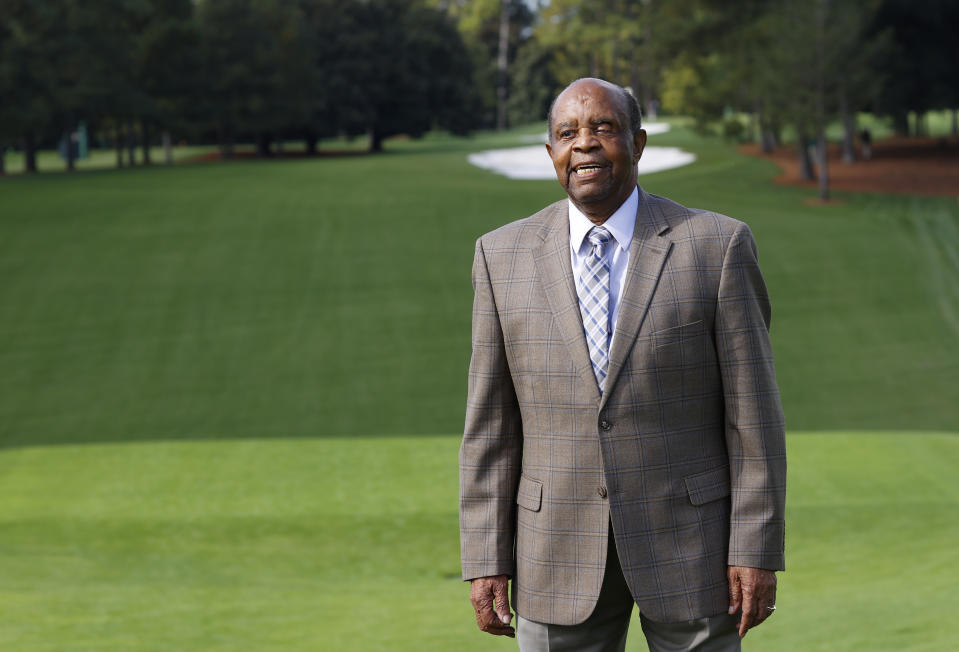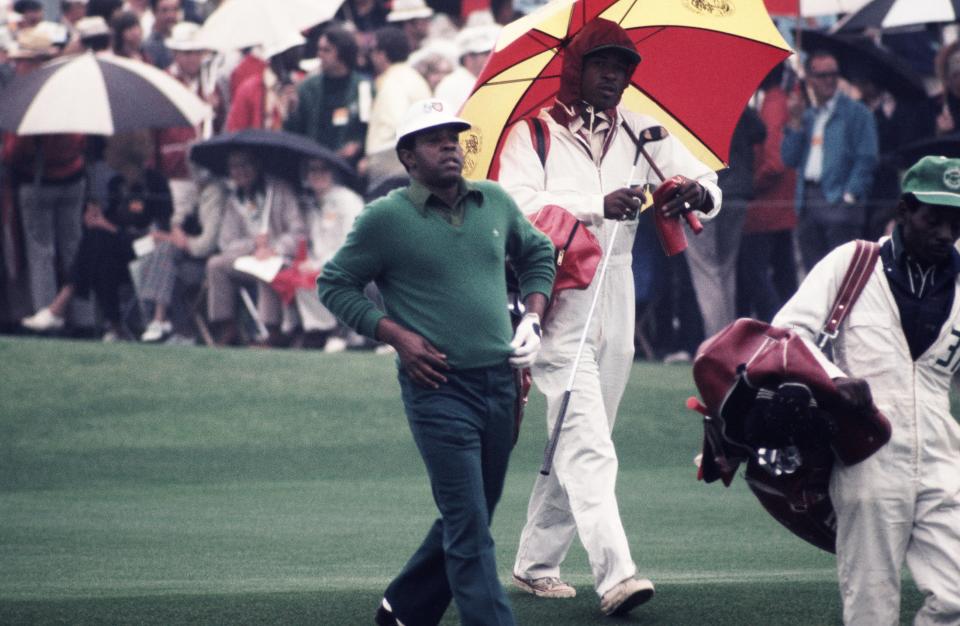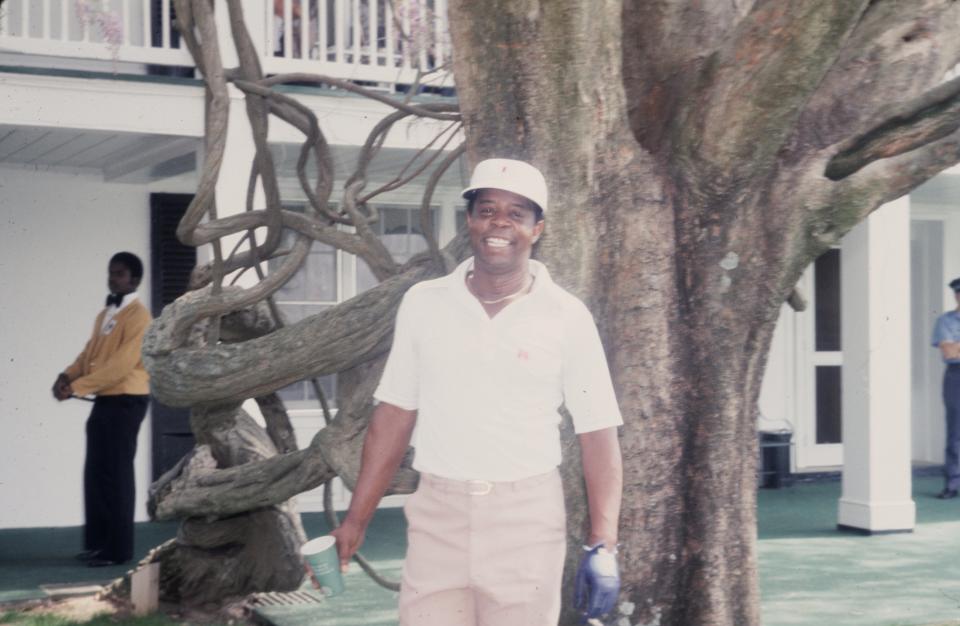Augusta National honors Lee Elder, first Black man to play the Masters
The first time Lee Elder played the Masters, he was so fearful for his safety, he rented two different houses in Augusta. Come 2021, he’ll have the honor of starting the tournament.
Elder, the first Black man to play in the Masters, will join Jack Nicklaus and Gary Player in serving as an honorary starter next April. It’s the culmination of a remarkable journey that started with death threats and ends with applause.
When Elder, now 86, began playing in the early 1960s, the only avenue available to him was the United Golf Association, a golf tour created to give Black players the opportunity to play. The UGA — the entity that existed before the PGA Tour split off in the late 1960s — had an explicit rule that players could only be of the “Caucasian” race, so Black players spent much of the 20th century consigned to the UGA. When the “Caucasian” clause was eliminated in 1961, the UGA ceased to exist … and players like Elder got their chance on golf’s largest stage.
In his rookie year, Elder vaulted into the golf world’s consciousness in December 1968, when he went toe-to-toe, shot-for-shot, with Jack Nicklaus in a sudden-death playoff at the American Golf Classic at Firestone. For five straight holes, Elder and Nicklaus matched one another, with Nicklaus finally gaining the edge on the sixth hole.

Elder lost the tournament, but won a small victory for public perception of Black golfers. Then-USGA president Maxwell Stanford, in the antiquated parlance of the time, noted that “Elder did more for Negro golf in 45 minutes than everybody else put together had done in 45 years.”
But not everyone was on board with Elder’s presence on the PGA Tour. When he won the Monsanto Open in 1974, defeating Peter Oosterhuis in a playoff, the Tour’s then-tournament director, Jack Tuthill, ushered Elder from the 18th green into a police car.
Threats on Elder’s life had been coming in all day, and local police and Tour officials judged it would be better to hold the trophy presentation indoors … and to use a police car, rather than a golf cart, to get there.
“It wasn’t the first time a Black athlete had received death threats,” Elder would say many years later, “and it wasn’t the last.”
The victory meant Elder was now eligible to potentially — emphasis on “potentially” — play in the 1975 Masters. He received a congratulatory phone call from the legendary chairman of Augusta National the next morning.
“Lee, this is Cliff Roberts,” the voice on the other end of the phone said.
“Yes, sir, Mr. Roberts, how are you?” Elder replied.
“I’m just calling to extend an invitation to the Masters to you,” Roberts said, “and I’d like to know if you’ll be coming.”
In what was surely one of the most unexpected responses Roberts ever received to a Masters invitation, Elder deferred.
“Well, I’m sorry, but I can’t say for sure right now,” he said. “It really depends on what I’m involved in.”
Elder had no intention of skipping the Masters, but he and his camp were playing the long game, looking to make a point about the club’s and the sport’s treatment of Blacks.
The Monsanto Open, later branded the Pensacola Open and played until 1988, was, at the time, a satellite event, meaning a victory there didn’t automatically entitle one to a Masters berth. Elder believed Roberts had withheld invitations from himself and other tournament winners before for debatable reasons
“I just wanted to give Cliff a taste of his own medicine,” Elder said later. “I knew there were examples where he’d held people off without giving them answers right away.”

Naturally, Elder accepted the invitation — this was the Masters, after all — and that transformed him into an instant star. He spent the next few months answering questions about the upcoming Masters. Once he arrived in Augusta, he was so beset by media he could play only six practice holes on Monday. A Tuesday news conference lasted three hours.
Elder felt secure while on the property at Augusta National, but outside the tall hedges, it was a different story. He heard racist shouts while driving to and from the course, and drew long, suspicious looks while in stores. All too aware of the death threats that had been rolling in for months, he rented two houses — one on Washington Road, one on Wheeler Road — and shuttled between them throughout the week.
Simply going out to eat in Augusta was a challenge for Elder. He and his party of 12 showed up at one restaurant early in the evening, before any other diners had arrived, only to be told there were no tables available. When news of the dismissal got out, Dr. Julius Scott of the historically Black Paine College in Augusta invited Elder and his party to dine with them the rest of the week, and they took him up on the offer.
In what was likely a deliberate move, Augusta National grouped Elder with Gene Littler and Miller Barber, two of the steadier and more veteran heads on Tour at the time. Before the grouping teed off on Thursday, Littler pulled Elder aside.
“This is probably going to be the hardest round you’ll ever play,” Littler said. “If I get in your way, just shout at me. I’m a little flaky and can get in my own little world out there, so do what you have to do to get my attention. I’ll understand.”
As he walked the hills of Augusta National, Elder saw more Black faces than he could ever recall at a PGA Tour event. And in a moving scene on Friday, members of the Augusta National staff lined the fairway on 18 as Elder walked toward the green.
“Thank you for coming, Mr. Elder!” one staff member shouted as tears rolled down Elder’s face.
Elder didn’t make the weekend, shooting 74 and 78 to miss the cut by four strokes. Nicklaus would go on to win his fifth green jacket, holding off Johnny Miller and Tom Weiskopf, but Elder’s two-day run was every bit as much the story of that Masters.
Elder would go on to play Augusta five more times from 1977 to 1981, his best finish a T17 in 1979. It was part of a respectable golf career that included four PGA Tour wins, eight Champions Tour wins and a slot on the winning 1979 Ryder Cup team at Greenbrier.
“He was a steady player, not overpowering,” recalls Andy Bean, Elder’s Ryder Cup teammate. “On the weeks when his putter was working, he’d get himself a nice check.”
Monday, Augusta National chairman Fred Ridley commemorated the 45th anniversary of Elder’s week at Augusta with a pair of honors. Elder will have the opportunity to start the 2021 Masters alongside Nicklaus and Player — hopefully, Ridley indicated, with patrons in attendance.
Beyond that ceremonial swing, though, Elder will have his name on something with more reach: two scholarships at Paine College, the same college that helped Elder out all those years ago. Augusta National will fund the scholarships, and will also provide the funding to create a women’s golf program at Paine, which is less than 5 miles from the club’s gates.
“The courage and commitment of Lee Elder and other trailblazers like him inspired men and women of color to pursue their rightful opportunity to compete and follow their dreams,” Ridley said while announcing the honors. “But in reality, that opportunity is still elusive for many. We have a long way to go, and we can and we must do more.”

_____
Jay Busbee is a writer for Yahoo Sports. Follow him on Twitter at @jaybusbee or contact him with tips and story ideas at jay.busbee@yahoo.com.
More Masters coverage from Yahoo Sports

 Yahoo Finance
Yahoo Finance 